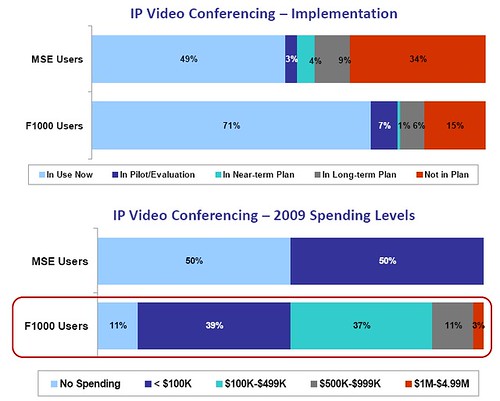Cisco, Tandberg, And The Future Of Videoconferencing For SMBs
Last week's announcement that Cisco was buying videoconferencing heavyweight Tandberg sent shockwaves through the industry. But as the dust clears, observers are starting to figure out what it might mean for the small and midsize companies that actually use the technology -- or might want to if videoconferencing better met their needs. And already smaller competitors are showing that they still have something different and valuable to offer SMBs.
October 6, 2009

Last week's announcement that Cisco was buying videoconferencing heavyweight Tandberg sent shockwaves through the industry. But as the dust clears, observers are starting to figure out what it might mean for the small and midsize companies that actually use the technology -- or might want to if videoconferencing better met their needs. And already smaller competitors are showing that they still have something different and valuable to offer SMBs.Don't Miss: Cisco Buying Tandberg, Broadening Videoconferencing Footprint
According to Richard Mahony and David Molony at consultancy Ovum, the $3 billion deal will help flesh out Cisco's high-end TelePresence offering of big-screen videoconferencing suites. That business is about a quarter of the overall market Ovum says, but it's not the part that most SMBs can even think of affording.
In fact, according to The InfoPro, midsize companies are far less likely to invest in IP videoconferencing than are large enterprises.
 Source: The InfoPro
Source: The InfoPro
That's where Tandberg comes in. The company "is ahead of the curve on the server side with multimedia content software," Ovum says, which could help move Cisco toward what I see as the Holy Grail for videconferencing among SMBs: interoperability so that companies can easily connect with offices of their partners, customers, and potential customers.
Ovum says:
The requirement for inter-company conferencing is increasing as companies federate more with partners and suppliers, and that is helping to drive a second wave of deployment of telepresence networks with 100 or more sites - compared with the typical 5-30 sites we have seen so far.
It ain't gonna be easy. Ovum again:
Interoperability was highlighted as a key feature [at the announcement], focused not just in-house between Cisco and Tandberg but between Cisco and other collaborative tech vendors such as Microsoft, as Cisco drives its network technology to be the center of collaborative working. At the global operations level, AT&T, BT and Cisco will now have to sort out which of BT's Global Video Exchange, Cisco's Intercompany CTS or even Tandberg's Global Exchange Service should be the global interoperability standard.
But even as the big fish try to work things out amongst themselves, the little guys in the market are busy trying to videoconferencing work for SMBs.
Last week, Glowpoint introduced what it called Telepresence "Interoperability as a Service," designed to connect those high-end Cisco TelePresence suites with standards-based telepresence and traditional video conferencing systems.
Vidyo, meanwhile, debuted its Telework HD video conferencing system designed for SMBs. The company says the "appliance supports up to 50 conference participants for less than the price of two video room systems." Using VidyoDesktop clients, participants can join conferences from home offices or laptops on the road. Systems with 5 ports and 25 user seats cost $7,000.
 ]VidyoConference is looking very Brady.
]VidyoConference is looking very Brady.
Finally, just today, LifeSize introduced its $2500 Passport system, which delivers 720P HD over any 1MBps Internet connection. More to the point, it works with Skype, so it can connect to a wide variety of videoconferencing installations.
Clearly, the Cisco/Tandberg combination will be a force to be reckoned with in the videoconferencing market -- it clearly has Polycom in its sights. But for budget-minded small and midsize businesses who need to talk with other companies, not just far-flung branches of their own companies, interoperability and affordability may be more important than sheer size.
Don't Miss:
Follow Fredric Paul on Twitter @ http://twitter.com/TheFreditorFollow bMighty.com on Twitter @ http://twitter.com/bMightyPut a bMighty gadget on your iGoogle page Get bMighty on your mobile device
About the Author
You May Also Like


